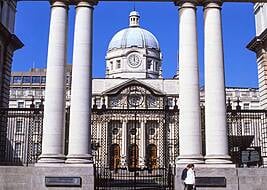A prominent anti-immigration activist who a court heard accused a crèche owner of promoting paedophilia and child molestation for placing children’s drawings of a rainbow flag in a window has been acquitted of committing a breach of the peace over the incident.
Philip Dwyer, a self-styled citizen journalist who has been a regular attendant at anti-immigration protests around the country in recent years, was found not guilty of engaging in threatening and abusive behaviour at the Daisy Chain Creche, Eden Centre, Grange Road, Rathfarnham, Dublin 16 on June 30th, 2021.
Mr Dwyer (56), a father of three from Tallaght Cross West, Tallaght Dublin 24, denied committing a breach of the peace contrary to Section 6 of the Criminal Justice (Public Order) Act 1994 at a sitting of Tallaght District Court on Thursday.
The crèche owner, Lucy Madigan, gave evidence that she spotted Dwyer filming with his mobile phone while sitting in his car outside the crèche as she arrived at her business after getting a call about an incident.
She recalled that Dwyer reacted by clapping his hands and stating: “Let’s go. Let’s do this” when she confirmed to him that she was the crèche’s owner.
When she asked Dwyer to delete the video, Ms Madigan said he responded by asking her if she was responsible for the rainbow flags in the window of the creche and accusing her of promoting paedophilia and child molestation.
She said Dwyer claimed the rainbow represented homosexuals and that he added that “homosexuals are paedophiles.”
The witness said he also accused her of “indoctrinating four-year-olds to welcome paedophiles into their life.”
Ms Madigan said she asked the defendant who was moving towards her to stay one metre away as it was during the time of Covid-19 restrictions.
She gave evidence that Dwyer told her to remove her mask and asked if she was ashamed to show her face.
Ms Madigan said the defendant kept coming towards her and was getting louder when she just wanted Mr Dwyer to delete his video as she thought the crèche and children had been recorded.
However, she claimed that he replied he would put the video online and “make you famous” but would delete the faces of any children.
She told the solicitor for the DPP, Tom Conlon, that she was “quite shaken and quite upset” by the incident.
Self-identified journalist
Ms Madigan agreed with counsel for the accused, Ciara Ní Gabhann BL, that Mr Dwyer had identified himself to her, but she could not recall that he had asked for a comment or interview or had identified himself as a journalist.
She recalled trying to tell Dwyer how the crèche operated a curriculum on diversity and inclusion but that he kept “shouting at me and shouting over me.”
Ms Madigan said she could not process how a stranger could walk up to her and accuse her of promoting paedophilia.
The court was shown videos recorded by the defendant which showed him telling the crèche owner that he would “expose” her for putting LGBTQ+ ideology into the minds of young children which was “absolutely disgraceful.”
When told by Ms Ní Gabhann that Mr Dwyer vehemently denied making any reference to paedophilia or child molestation, Ms Madigan replied: “One hundred per cent he told me that all homosexuals are paedophiles and that they are child molesters.”
She accepted that no children were recorded in the videos shown in court.
Garda Trevor Timpson told the court that he found Ms Madigan very frightened and upset by the incident after the matter was reported to gardáí.
He recalled that the businesswoman was “extremely worried” that the accused would return and attack them while out in a public place.
The garda said Ms Madigan, who owned a number of crèches, was also concerned that he would also appear at other locations.
A childcare assistant at the crèche, Danielle Cramp, said she was approached by the defendant as she returned from a walk with two young children.
Ms Cramp said she felt intimidated at Mr Dwyer shouting at her from about 20 feet away if she was responsible for the rainbow flag and accusing her of “inciting paedophilia and incriminating young people’s minds.”
In response to the suggestion by Ms Ní Gabhann that the accused had no engagement with her, Ms Cramp replied: “That’s not true.”
Pony Express
In evidence, Mr Dwyer explained that he had been delivering a package while working as a contract courier for Pony Express when he noticed the rainbow drawing in the window of the crèche promoting Gay Pride 2021.
The accused, who described himself as both a citizen journalist and trainee journalist, said he wanted to ask the owner of the crèche why they were doing that to children.
“My intention was to make a story. I felt strongly that parents need to be made aware if it is happening in a crèche,” he added.
The defendant admitted he became “mildly irritated” and had raised his voice because he felt children were being groomed as well as being “quite annoyed” about what was happening in the crèche.
He repeatedly denied having used the word “paedophilia” when speaking to crèche staff.
Mr Dwyer said his intention was to give them “a fair opportunity” to explain what was going on , while he was very conscious of not filming any children.
As a journalist, he said he asked difficult questions and had a “robust conversation.”
Mr Dwyer, who unsuccessfully contested this year’s local and euro elections for the far-right party, Ireland First, told the court he had become active as a citizen journalist after the 2020 general election.
He understood a video of the crèche incident that he had posted online had been removed by YouTube.
The defendant disagreed with the suggestion by the prosecution that his reckless behaviour had caused a breach of the peace.
In a closing submission, Ms Ní Gabhann said journalism would be seriously undermined if a journalist asking uncomfortable questions constituted a breach of the peace.
Mr Conlon argued that the defendant had been “threatening, abusive and insulting.”
“In essence he was a nuisance,” the solicitor added.
Dismissing the charge, Judge Patricia McNamara said she found that the accused did not intend to commit a breach of the peace on the day.
The judge said she did not believe the threshold to find him guilty of the offence had been met, and he was entitled to the benefit of the doubt.
Judge McNamara remarked that she was not making a judgement “on anything else.”







